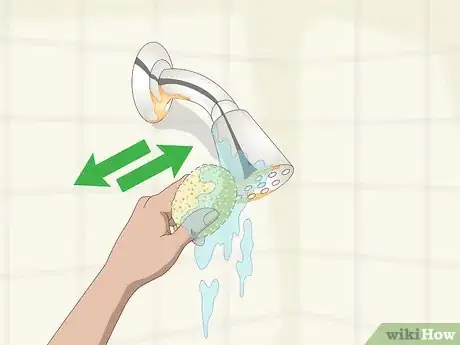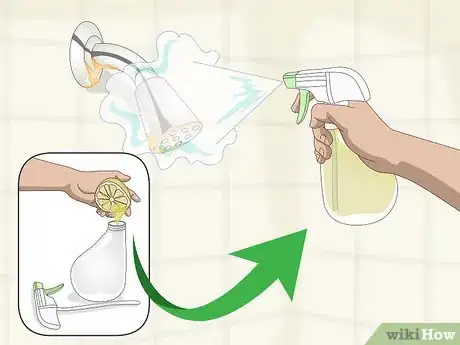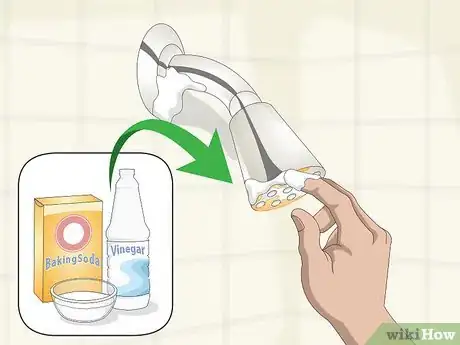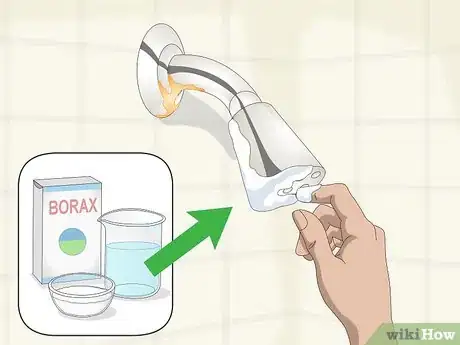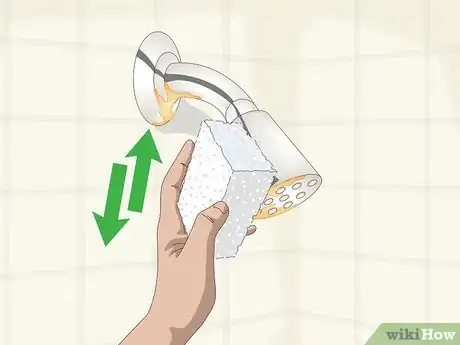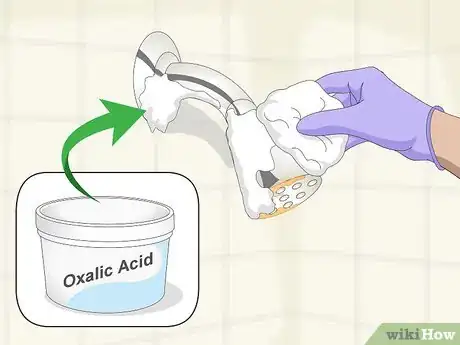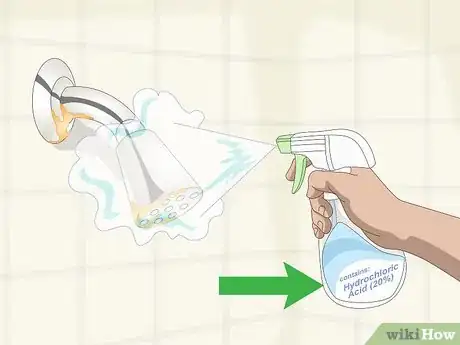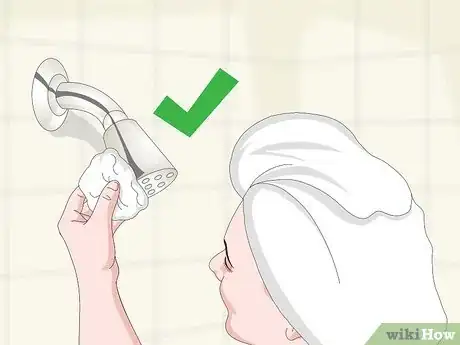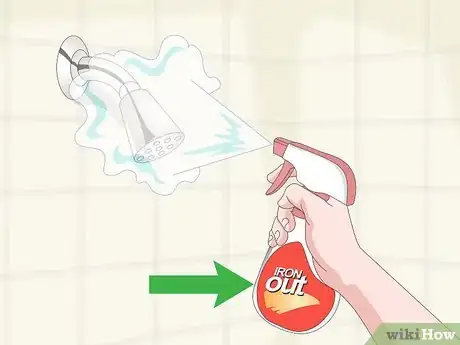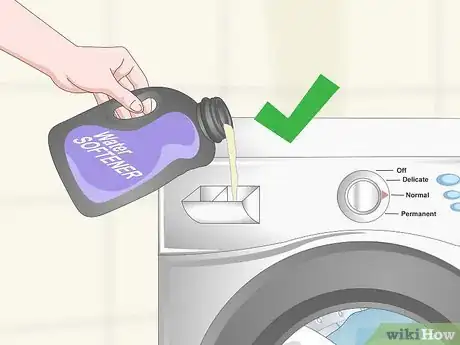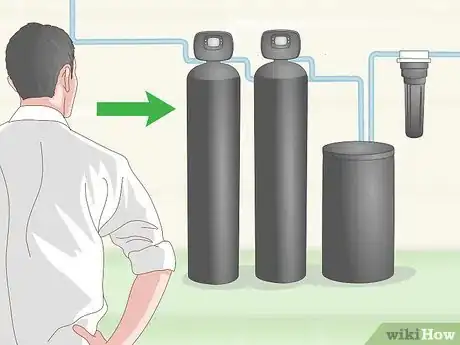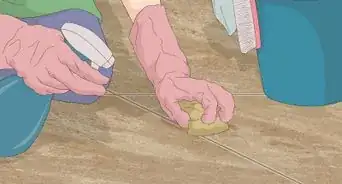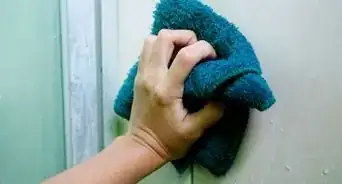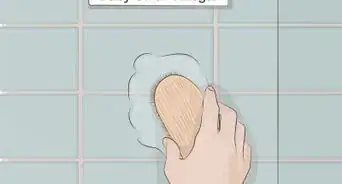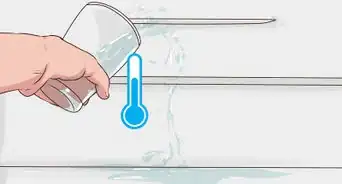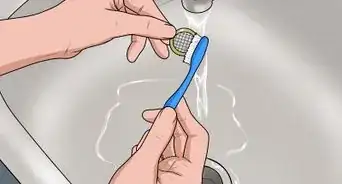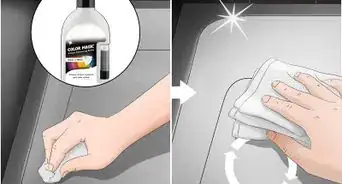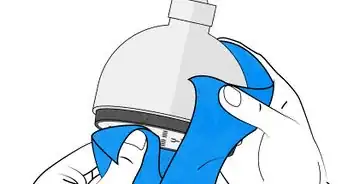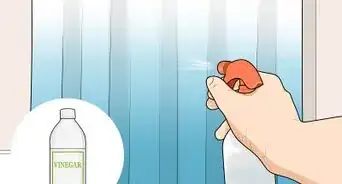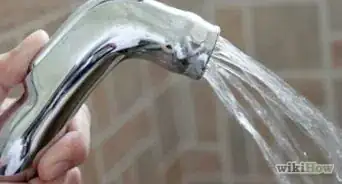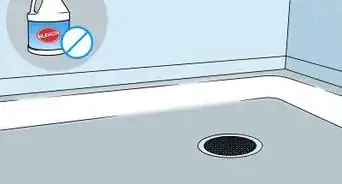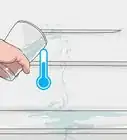This article was co-authored by Erik Bakirov. Erik Bakirov is a Cleaning Specialist at Room413 Cleaning in Los Angeles, California. Erik specializes in deep, move-in, and move-out cleaning services. Room413 matches homeowners with reliable and trustworthy cleaning services. They also promote environmentally friendly cleaning products.
There are 8 references cited in this article, which can be found at the bottom of the page.
This article has been viewed 159,304 times.
Orange stains in your shower are likely hard water stains caused by excess minerals like magnesium and iron in your water. Even if your water appears clear, the minerals will oxidize with air and stick to soap scum in the shower. They are not harmful to your health but can be unsightly. If you have hard water stains, your shower’s water will produce less lather out of soap, which is a good test before beginning treatment.[1]
Steps
Using Natural Cleaners
-
1Try scrubbing with water and a rough sponge. If you do not have aggressive stains, or the stains are relatively new, you may be able to remove soap buildup that has become stained with a rough sponge, water, and vigorous scrubbing.
- Do not scrub so hard that you damage the finishing of your shower or tub, as this will create a texture that is harder to clean.
-
2Use a lemon juice and water solution. Squeeze the juice of a lemon into a spray bottle, and fill the rest of the spray bottle with water. Spray the solution onto your stains, and let it stay for 10 minutes before wiping it down. Repeat as necessary.Advertisement
-
3Use a paste made from white vinegar and baking soda. Dry the stain, then spread the mixture over it and allow it to sit for 15 minutes before scrubbing lightly with a cloth.[2] Dry the area well.
-
4Use a paste made from hot water and borax. Borax, a mineral and salt that comes from boric acid, is available in powder form at hardware and grocery stores, as well as online. Create a paste with 1 tablespoon of borax and two cups of hot water. Apply to the stain and let it sit overnight before rubbing it off with a cloth.[3]EXPERT TIPAndrii Gurskyi is the owner and founder of Rainbow Cleaning Service, a New York City cleaning company specializing in apartments, homes, and moving cleanup using non-toxic and artificial fragrance free cleaning solutions. Founded in 2010, Andrii and Rainbow Cleaning Service has served over 35,000 customers.House Cleaning Professional

 Andrii Gurskyi
Andrii Gurskyi
House Cleaning ProfessionalIf natural cleaners don't work, you can use chlorine bleach. Only use chlorine bleach when there is adequate ventilation in the bathroom. If you still can't remove the stains, you can always call a professional cleaning service that knows the best way to deal with them.
Using Specialty Cleaners
-
1Try rubbing with a wet Mr. Clean Magic Eraser. Mr. Clean Magic Eraser is a cleaning product made with chemicals (melamine, formaldehyde and sodium bisulfate). Saturate the eraser with water to activate the chemicals, squeeze it onto the stain, then rub in gentle, circular motions. Rinse with more water.[4]
-
2Use a cleaner with oxalic acid. Although oxalic acid is found in nature, it is poisonous and harsh, so make sure to fully rinse the product off with water, and avoid these cleaners if you have a septic tank. Most oxalic acid cleaners, like “ZUD” require that you let the solution sit for 1 to 1 and ½ hours before rubbing and rinsing it away.[5]
-
3Use a cleaner with hydrochloric acid. Different products will have different amounts of hydrochloric acid in them. Look for a product with about 20% hydrochloric acid, like The Works. Spray and let sit according to the products directions.
Preventing Future Stains
-
1Wipe the shower dry after use. This will prevent mineral buildup on the moisture and soap scum in your shower.
-
2Use products specifically made to prevent iron stains stains. Products like Iron Out claim to not only fight iron stains, but also to prevent stains when used as a regular cleaning product.
-
3Use a liquid or powder water softener in your washing machine. If used in your washing machine, these products will hopefully enter your entire water system, and lessen the minerals in your water.[9]
-
4Purchase a water softener system, or an iron filter. Both of these products are tanks installed in your plumbing.
- A water softener system will use salt or potassium-chloride to mix other minerals into your water and reduce the concentration of stain-causing iron and magnesium.[10]
- An iron filter filters out the iron and magnesium in your water without adding any other compounds, and only needs to be replaced about every 10 years.[11]
EXPERT TIPAndrii Gurskyi is the owner and founder of Rainbow Cleaning Service, a New York City cleaning company specializing in apartments, homes, and moving cleanup using non-toxic and artificial fragrance free cleaning solutions. Founded in 2010, Andrii and Rainbow Cleaning Service has served over 35,000 customers.House Cleaning Professional
 Andrii Gurskyi
Andrii Gurskyi
House Cleaning ProfessionalConsider testing your water if you have orange stains in the bathroom. Orange stains are caused by hard water, which is usually found in cities. If you're not sure whether you have hard water, speak to a plumber about testing your water, because hard water can do damage to your hair.
Community Q&A
-
QuestionWhat if none of this works? I get orange stains even with correct use of water softener, and cannot afford professional cleaner.
 Free EagleCommunity AnswerThe best product I've found to remove rust (the orange stains) or calcium from a shower or tub is Extra strength scrubbing bubbles. Don't get the spray can, but the trigger spray bottle. Spray it on, leave it sit for a few minutes, then take a scrub brush to it and rinse it off. If this or a couple of applications of this don't work, then take some muriatic acid (available at hardware store). Dilute the acid - 1 cup acid to 5 parts water. Using a brush to apply and scrub in all directions. Be sure to use rubber gloves and safety glasses.
Free EagleCommunity AnswerThe best product I've found to remove rust (the orange stains) or calcium from a shower or tub is Extra strength scrubbing bubbles. Don't get the spray can, but the trigger spray bottle. Spray it on, leave it sit for a few minutes, then take a scrub brush to it and rinse it off. If this or a couple of applications of this don't work, then take some muriatic acid (available at hardware store). Dilute the acid - 1 cup acid to 5 parts water. Using a brush to apply and scrub in all directions. Be sure to use rubber gloves and safety glasses.
Warnings
- Before treating, make sure you are not dealing with pink, slimy stains, as this is a harmful bacterial mould called Serratia marcescens that should be removed with bleach, although very severe hard water stains can also result in gelatinous material.⧼thumbs_response⧽
Things You'll Need
- A rough sponge
- A pumice stick
- A soft cloth
- A lemon
- White vinegar
- Baking soda
- Powdered Borax
- Mr. Clean Magic Eraser
- Cleanser with oxalic acid
- Cleanser with hydrochloric acid
- A dry towel
- Iron Out
- Liquid or powder water softener
- A water softener system or iron filtration system
References
- ↑ https://www.stylemepretty.com/living/2010/07/23/removing-hard-water-stains/
- ↑ https://www.youtube.com/watch?v=CsUBBTo3tM0
- ↑ http://eartheasy.com/live_nontoxic_solutions.htm
- ↑ https://www.wired.com/2015/09/whats-inside-mr-clean-magic-eraser/
- ↑ http://www.dailymail.co.uk/sciencetech/article-2718233/Forget-expensive-cleaning-products-use-POTATO-clean-house-Expert-reveals-science-foods-tackle-rust-limescale-stains.html
- ↑ Erik Bakirov. Cleaning Specialist. Expert Interview. 7 January 2021.
- ↑ Erik Bakirov. Cleaning Specialist. Expert Interview. 7 January 2021.
- ↑ Erik Bakirov. Cleaning Specialist. Expert Interview. 7 January 2021.
- ↑ https://www.stylemepretty.com/living/2010/07/23/removing-hard-water-stains/
About This Article
If you have orange stains in your shower, try scrubbing the stains with water and a rough sponge. For older stains that are tougher to remove, mix together baking soda and vinegar until you get a paste, then spread the paste onto the stains. After letting it sit for 15 minutes, scrub the area lightly with a cloth. If you want to use a specialty cleaner to get rid of your stains, try using products that contain oxalic acid, most of which require you to let the solution sit for an hour before rubbing and rinsing it away. Since oxalic acid is a harsh, poisonous chemical, make sure to fully rinse the cleaner off when you’re done and avoid these products if you have a septic tank. For more tips, like how to prevent future stains, scroll down.
